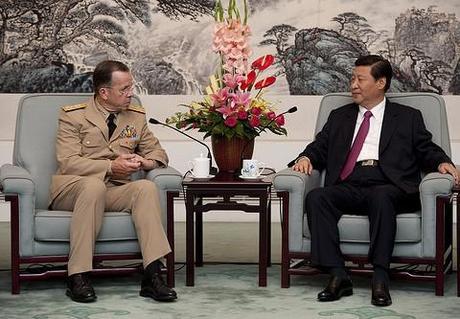
Chinese Vice President Xi Jinping (r) chats with Chairman of the Joint Chiefs of Staff Adm. Mike Mullen. Photo credit: Chairman of the Joint Chiefs of Staff
Xi Jinping, China’s vice president and the man hotly tipped to succeed Hu Jintao as Communist Party leader and China’s president, embarked on a get-to-know-you tour of the United States on Tuesday. The high-profile visit has encouraged the commentariat to examine somewhat strained US-Sino relations.
Xi’s visit got off to a awkwardish start when his US counterpart, Vice President Joe Biden, declared that the United States and China could cooperate “only if the game is fair” during a toast at a February 14 State Department welcome lunch. Biden, who has reportedly been put in charge of China policy, raised the issue of jailed Chinese dissidents and said about Syria, “we strongly disagreed with China and Russia’s veto of a resolution against the unconscionable violence being perpetrated” by the government. Also on the list of American concerns, reported The New York Times, were China’s artificially depressed currency and conditions imposed by the Chinese that require foreign companies to turn over technology in return for doing business in China.
“The United States has been stiffening its language toward China in recent months, most notably in President Obama’s visit to Asia last November, and again during his State of the Union address last month, when he challenged China to play by the same economic rules as other countries,” noted The New York Times.
A rare opportunity. The Wall Street Journal said that Xi’s visit ”could shape the bilateral relationship for a decade to come … U.S. officials see Mr. Xi’s trip as a rare opportunity for officials, lawmakers and business leaders to get to know the man who is expected to be promoted to Communist Party chief—the nation’s top job—in a once-a-decade leadership change in October or November.” For China, said the newspaper, “the priority is to establish Mr. Xi’s image at home and overseas as a future world leader capable of handling relations with the U.S.” The paper analysed the statements put out so far by both sides and observed that, “neither side … is willing to be seen giving ground on the major disputes between them in a year of political transition.”
Xi’s delegation of about 200 people was greeted by hundreds of protesters, including Tibetan and ethnic Uighur activists, Chinese democracy campaigners, and members of the Falun Gong spiritual movement, which is banned in China, reported The Wall Street Journal.
Free and frank discussions. “US, China must learn to trust each other,” stressed an editorial in GulfNews.com, which acknowledged that the world’s two superpowers have “radically different views on the way the world might work since they come from very different backgrounds. One has a firmly capitalist and libertarian tradition and is just over 200 years old; while the other is a Communist regime, which has inherited the world’s oldest empire.” Regardless of their differences, said GulfNews.com, it is “vitally important that both China and the US get along in the community of nations.” The site called for both sides to have some “free and frank observations” so as to “build the basis of an honest understanding for the future. To date, China has not been an aggressive superpower, but its strategic investments around the world are giving it a very long reach which has alarmed the US. In turn, China has a clear sense that the US and its allies are seeking to encircle it militarily and trap it within its borders.”
Chinese leadership focused primarily on domestic challenges. Writing at The Guardian’s Comment is free, Jonathan Fenby said “Obama has been groping for a relationship with Beijing since his visit to China in 2009” and “like Europe, the United States appears to have little clear notion of how to deal with the big new kid on the block.” “In part, this is because, aside from defending its ‘core interests’ of Tibet, Xinjiang, Taiwan and the Communist party-led politico-economy system, China’s diplomacy often seems to amount to little more than the pursuit of raw material supplies to feed its economic machine. It is correspondingly difficult to engage with.” Fenby concluded that China’s “domestic challenges, rather than foreign relations, will be the key to China’s development, as it tries to move away from the old growth model. The world will have to reconcile itself to sitting on the sidelines and watching as the story is played out in Beijing, Shanghai, Guangdong, Chongqing and a hundred other places far from the White House.”

